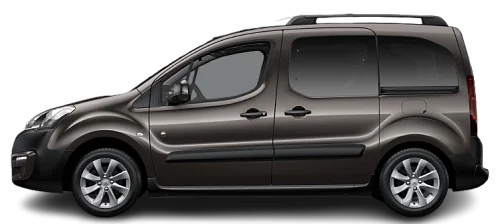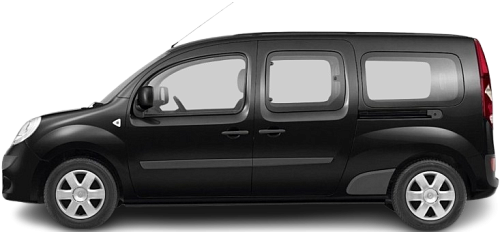USA EV Comparison: Peugeot Partner Tepee Electric vs Renault Kangoo Z.E. (E-Tech) Maxi
Struggling to Decide? Let AI Help!
Your AI Summary Is Ready!
General Info
Both vehicles have been discontinued and were never available for sale in the United States.
The two vehicles share the same body style: Minivan.
| Property | Peugeot Partner Tepee Electric | Renault Kangoo Z.E. (E-Tech) Maxi |
|---|---|---|
| Years of Production | 2017-2020 | 2011-2017 |
| Current Status | Discontinued | Discontinued |
| Country of Manufacture | UK | France |
| Body Style | Minivan | Minivan |
| Market Availability | EU | EU |
| GCC Score | 4.5 | 4.7 |
Range and Efficiency
The Renault Kangoo Z.E. Maxi (2011-2017) boasts a greater real-world range, a larger battery, and superior energy efficiency compared to the Peugeot Partner Tepee Electric (2017-2020).
| Property | Peugeot Partner Tepee Electric | Renault Kangoo Z.E. (E-Tech) Maxi |
|---|---|---|
| Range (WLTP) | 66 mi | - Range (WLTP) |
| Range (GCC) | 68 mi | 80 mi |
| Battery Capacity (Nominal) | 22.5 kWh | 22 kWh |
| Battery Capacity (Usable) | 20.5 kWh | 21 kWh |
| Efficiency per 100 mi | 30.1 kWh/100 mi | 26.3 kWh/100 mi |
| Efficiency per kWh | 3.32 mi/kWh | 3.81 mi/kWh |
| Range and Efficiency Score | 4.1 | 5 |
Charging
Both vehicles utilize a standard 400-volt architecture.
The Renault Kangoo Z.E. Maxi (2011-2017) has no DC fast charging capability, whereas the Peugeot Partner Tepee Electric (2017-2020) can charge at up to 40 kW.
The Peugeot Partner Tepee Electric (2017-2020) features a more powerful on-board charger, supporting a maximum AC charging power of 3.7 kW, whereas the Renault Kangoo Z.E. Maxi (2011-2017) is limited to 3.5 kW.
| Property | Peugeot Partner Tepee Electric | Renault Kangoo Z.E. (E-Tech) Maxi |
|---|---|---|
| Max Charging Power (AC) | 3.7 kW | 3.5 kW |
| Max Charging Power (DC) | 40 kW | - Max Charging Power (DC) |
| Architecture | 400 V | 400 V |
| Charge Port | CHAdeMO | Type 1 (J1772) |
| Charging Score | 3.1 | 2.2 |
Performance
Both vehicles are front-wheel drive.
The Peugeot Partner Tepee Electric (2017-2020) boasts greater motor power and accelerates faster from 0 to 60 mph.
| Property | Peugeot Partner Tepee Electric | Renault Kangoo Z.E. (E-Tech) Maxi |
|---|---|---|
| Drive Type | FWD | FWD |
| Motor Type | PMSM | EESM |
| Motor Power (kW) | 49 kW | 44 kW |
| Motor Power (hp) | 66 hp | 59 hp |
| Motor Torque | 148 lb-ft | 166 lb-ft |
| 0-60 mph | 18.8 s | 21.8 s |
| Top Speed | 68 mph | 81 mph |
| Performance Score | 1.2 | 1.4 |
Dimensions
The Renault Kangoo Z.E. Maxi (2011-2017) is longer, but has a similar width and height to the Peugeot Partner Tepee Electric (2017-2020).
The Renault Kangoo Z.E. Maxi (2011-2017) boasts a more extended wheelbase.
| Property | Peugeot Partner Tepee Electric | Renault Kangoo Z.E. (E-Tech) Maxi |
|---|---|---|
| Length | 172.4 in | 181 in |
| Width (with Mirrors) | - Width (with Mirrors) | 84 in |
| Width (w/o Mirrors) | 73.1 in | 72 in |
| Height | 71.7 in | 70.9 in |
| Wheelbase | 107.4 in | 121.3 in |
Cargo and Towing
The Renault Kangoo Z.E. Maxi (2011-2017) provides more cargo capacity, featuring both a larger trunk and more space with the rear seats folded.
Neither car is equipped with a frunk (front trunk).
Neither vehicle is officially rated for towing in the US.
| Property | Peugeot Partner Tepee Electric | Renault Kangoo Z.E. (E-Tech) Maxi |
|---|---|---|
| Number of Seats | 5 | 5 |
| Curb Weight | 3701 lb | 3466 lb |
| Cargo Volume (Trunk) | 19.2 ft3 | 45.9 ft3 |
| Cargo Volume (Max) | 84.8 ft3 | 120.1 ft3 |
| Cargo Volume (Frunk) | - Cargo Volume (Frunk) | - Cargo Volume (Frunk) |
| Towing Capacity | - Towing Capacity | - Towing Capacity |
| Cargo and Towing Score | 7.1 | 7.5 |




